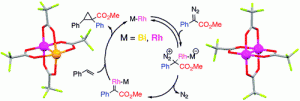Authors: Jo̷rn Hansen, Bo Li, Evgeny Dikarev, Jochen Autschbach and Huw M. L. Davies
J. Org. Chem.,
2009, 74 (17), 6564–6571
The catalytic activity of heterobimetallic Bi−Rh paddlewheel carboxylate complexes has been evaluated for the first time in the context of metal carbenoid chemistry. The Bi−Rh carboxylate complexes were found to effectively catalyze both cyclopropanation reactions and C−H insertions as well as reactions involving ylide intermediates with similar selectivity profiles to analogous dirhodium complexes. The heterometallic complex BiRh(O2CCF3)3(O2CCH3) was found to be approximately 1600 times less reactive than its homometallic analogue Rh2(O2CCF3)3(O2CCH3) toward the decomposition of methyl phenyldiazoacetate. The observed difference in reactivity is in good agreement with a computational model system where axial coordination to the second rhodium active site is considered for the dirhodium catalyst.


